2009 TOYOTA FJ CRUISER heating
[x] Cancel search: heatingPage 117 of 432
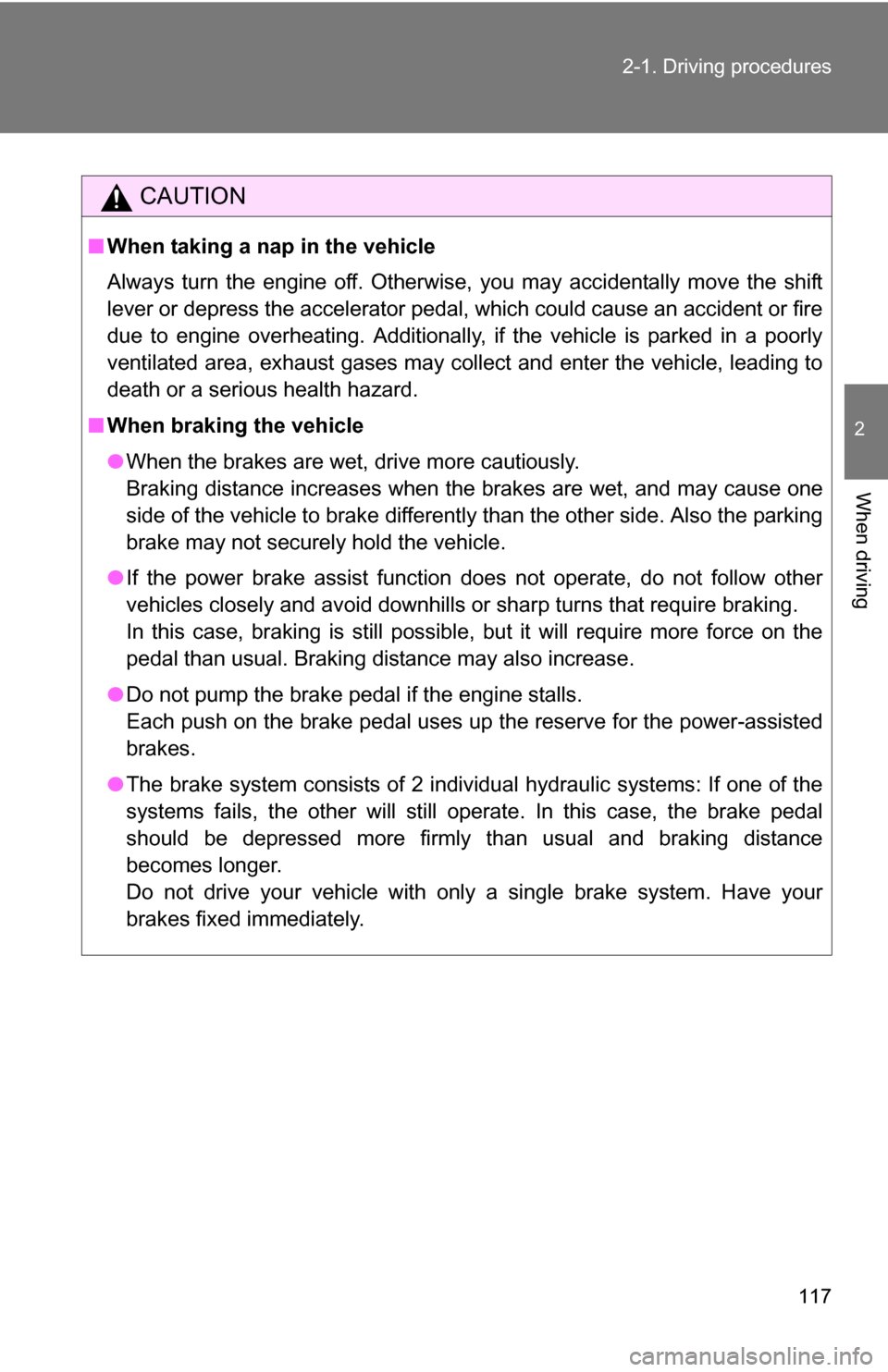
117
2-1. Driving procedures
2
When driving
CAUTION
■
When taking a nap in the vehicle
Always turn the engine off. Otherwise, you may accidentally move the shift
lever or depress the accelerator pedal, which could cause an accident or fire
due to engine overheating. Additionally, if the vehicle is parked in a poorly
ventilated area, exhaust gases may collect and enter the vehicle, leadin\
g to
death or a serious health hazard.
■ When braking the vehicle
●When the brakes are wet, drive more cautiously.
Braking distance increases when the brakes are wet, and may cause one
side of the vehicle to brake differently than the other side. Also the parking
brake may not securely hold the vehicle.
● If the power brake assist function does not operate, do not follow other
vehicles closely and avoid downhills or sharp turns that require braking.
In this case, braking is still possible, but it will require more force on the
pedal than usual. Braking distance may also increase.
● Do not pump the brake pedal if the engine stalls.
Each push on the brake pedal uses up the reserve for the power-assisted
brakes.
● The brake system consists of 2 individual hydraulic systems: If one of the
systems fails, the other will still operate. In this case, the brake pedal
should be depressed more firmly than usual and braking distance
becomes longer.
Do not drive your vehicle with only a single brake system. Have your
brakes fixed immediately.
Page 129 of 432
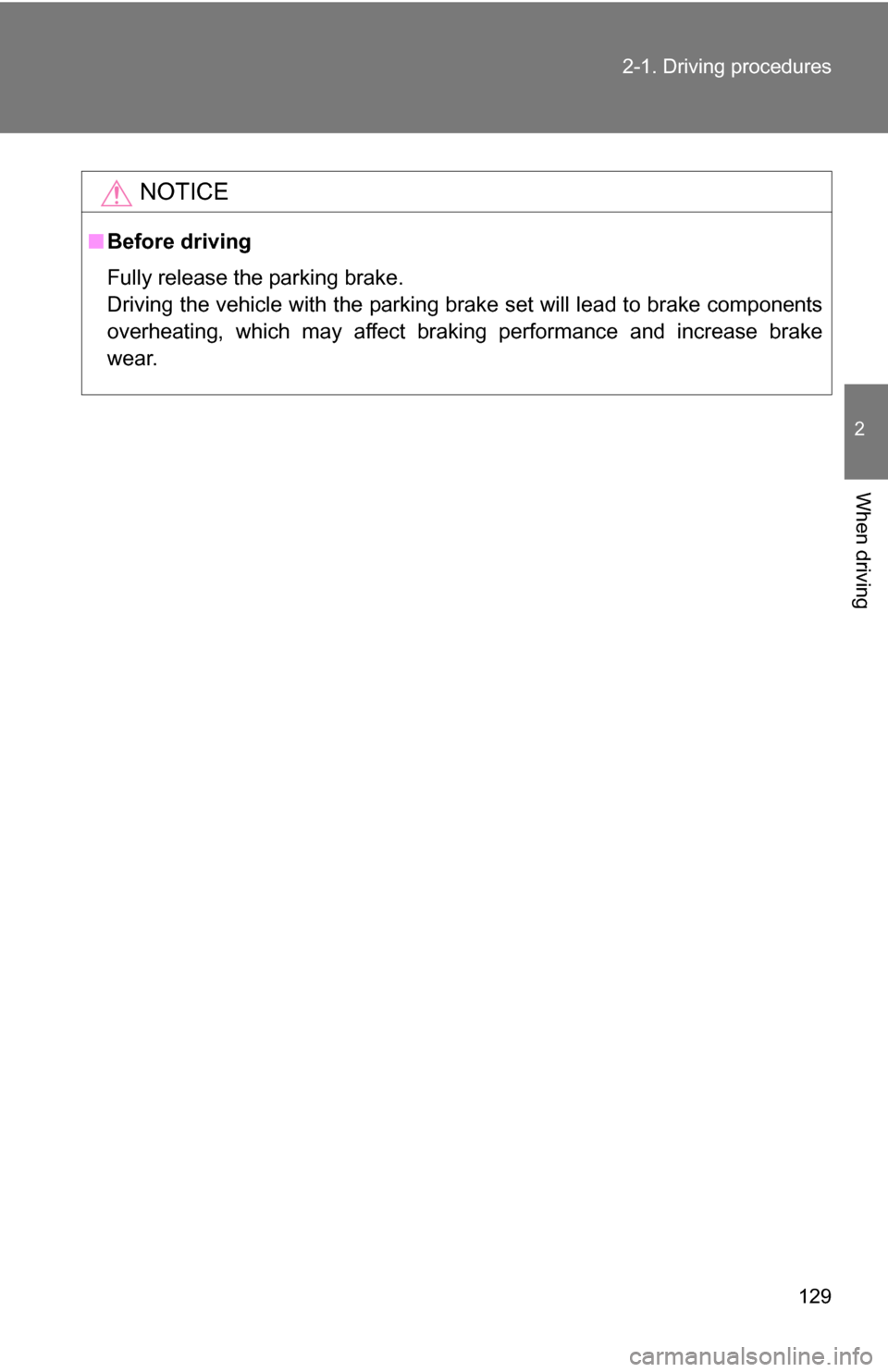
129
2-1. Driving procedures
2
When driving
NOTICE
■
Before driving
Fully release the parking brake.
Driving the vehicle with the parking brake set will lead to brake components
overheating, which may affect braking performance and increase brake
wear.
Page 133 of 432
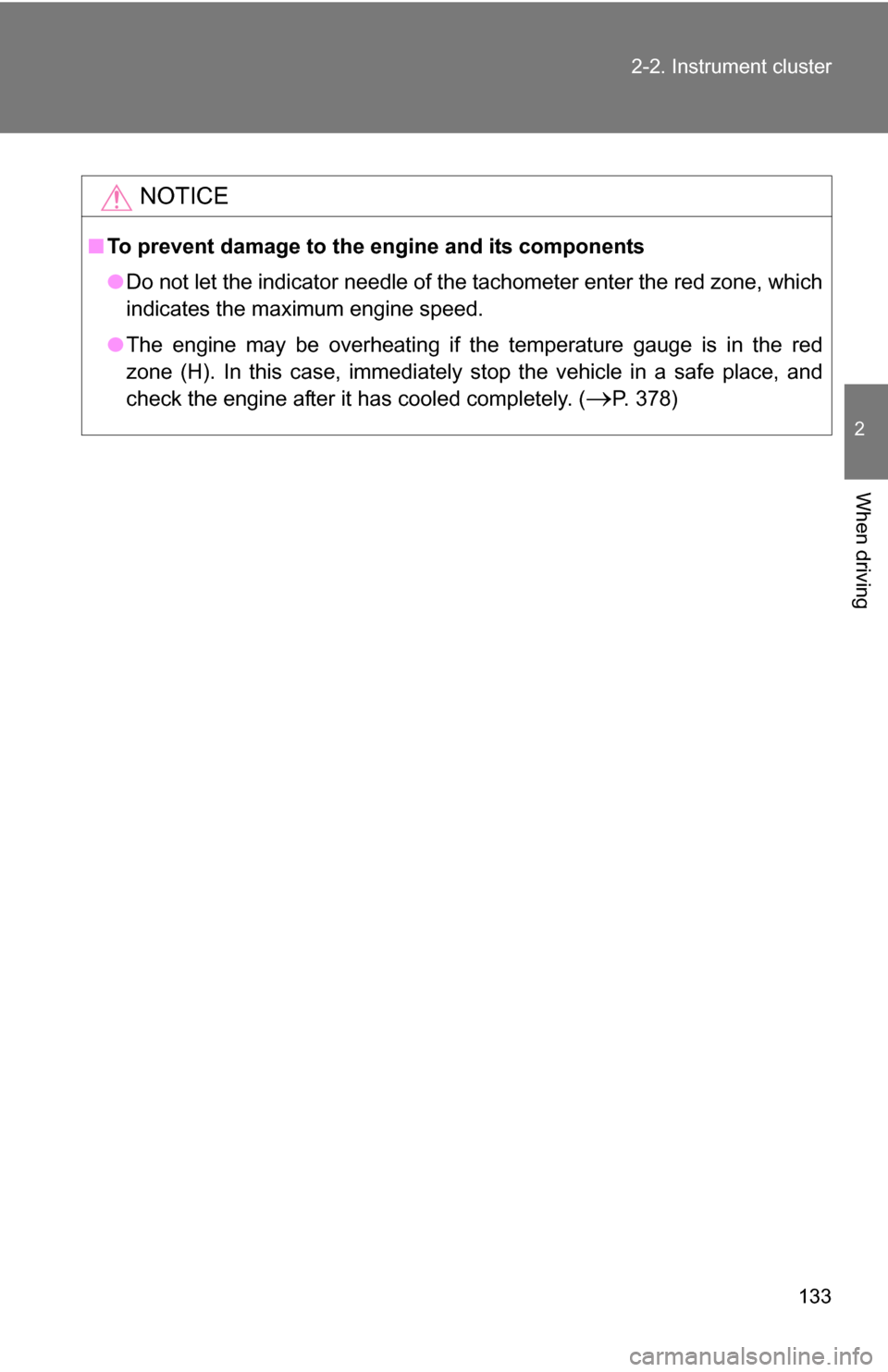
133
2-2. Instrument cluster
2
When driving
NOTICE
■
To prevent damage to the engine and its components
●Do not let the indicator needle of the tachometer enter the red zone, which
indicates the maximum engine speed.
● The engine may be overheating if the temperature gauge is in the red
zone (H). In this case, immediately stop the vehicle in a safe place, and
check the engine after it has cooled completely. (
P. 378)
Page 192 of 432

192 2-5. Driving information
●Note that when making a turn, th e trailer wheels will be closer than
the vehicle wheels to the inside of the turn. Compensate by making
a larger than normal turning radius.
● Crosswinds and rough roads will adversely affect handling of your
vehicle and trailer, causing sway . Periodically check the rear to
prepare for being passed by large trucks or buses, which may
cause your vehicle and trailer to sway. If swaying occurs, firmly grip
the steering wheel, reduce speed immediately but gradually, and
steer straight ahead. Never increase speed. If you make no
extreme correction with the stee ring or brakes, your vehicle and
trailer will stabilize.
● Take care when passing other v ehicles. Passing requires consider-
able distance. After passing a vehi cle, do not forget the length of
your trailer, and be sure you hav e plenty of room before changing
lanes.
● In order to maintain engine braking efficiency, do not use the trans-
mission in D (automatic transmission) or 6 (manual transmission).
● Due to the added load of the trailer, your vehicle’s engine may
overheat on hot days (at temper atures over 85°F [30°C]) when
driving up a long or steep grade. If the engine coolant temperature
gauge indicates overheating, immediately turn off the air condition-
ing (if in use), pull your vehicle off the road and stop in a safe spot.
( P. 378)
Page 259 of 432
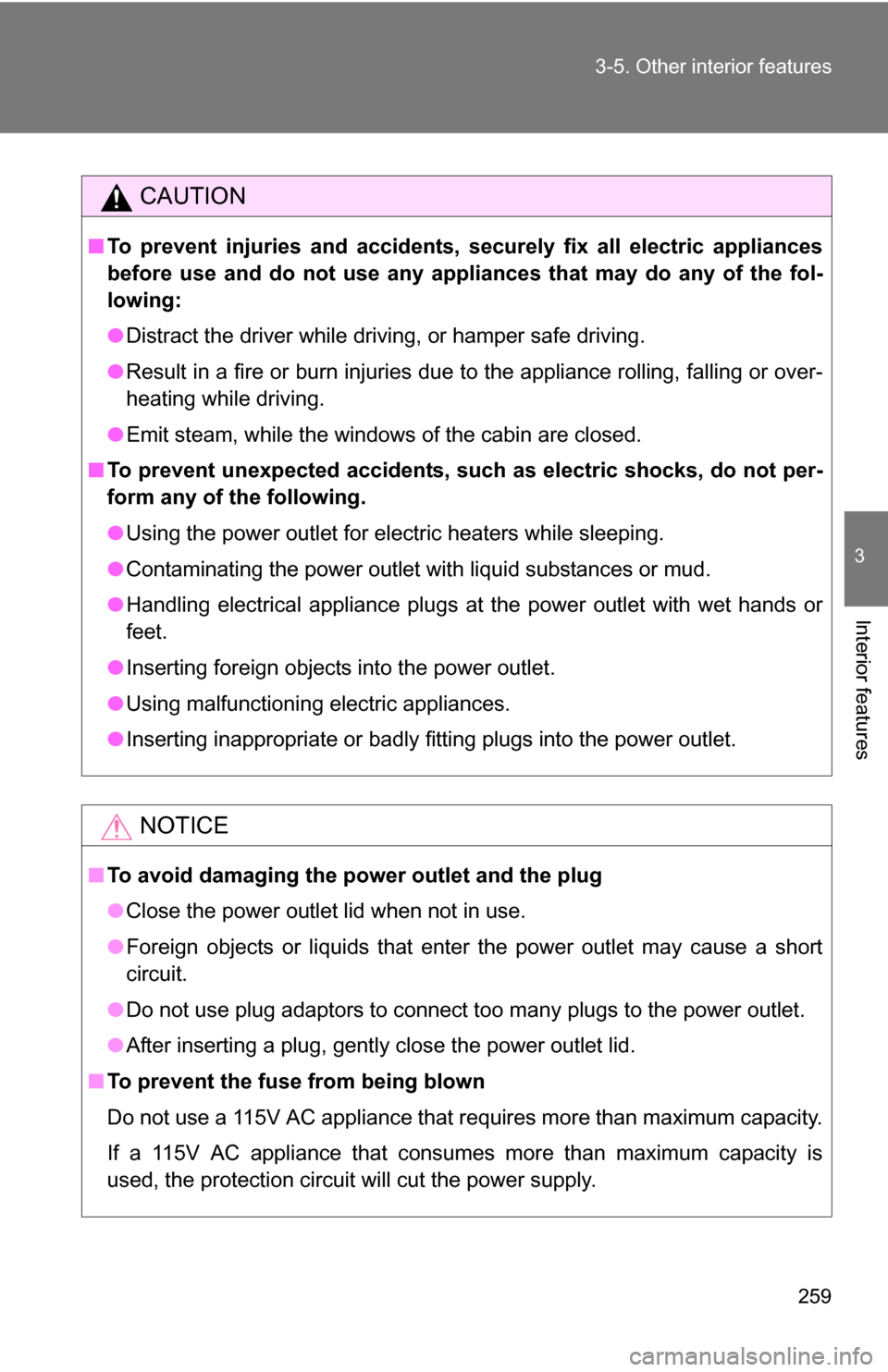
259
3-5. Other interior features
3
Interior features
CAUTION
■
To prevent injuries and accidents, secu rely fix all electric appliances
before use and do not use any app liances that may do any of the fol-
lowing:
● Distract the driver while driving, or hamper safe driving.
● Result in a fire or burn injuries due to the appliance rolling, falling or over-
heating while driving.
● Emit steam, while the windows of the cabin are closed.
■ To prevent unexpected accidents, such as electric shocks, do not per-
form any of the following.
●Using the power outlet for electric heaters while sleeping.
● Contaminating the power outlet with liquid substances or mud.
● Handling electrical appliance plugs at the power outlet with wet hands or
feet.
● Inserting foreign objects into the power outlet.
● Using malfunctioning electric appliances.
● Inserting inappropriate or badly fitting plugs into the power outlet.
NOTICE
■To avoid damaging the power outlet and the plug
●Close the power outlet lid when not in use.
● Foreign objects or liquids that enter the power outlet may cause a short
circuit.
● Do not use plug adaptors to connect too many plugs to the power outlet.
● After inserting a plug, gently close the power outlet lid.
■ To prevent the fuse from being blown
Do not use a 115V AC appliance that requires more than maximum capacity.
If a 115V AC appliance that consumes more than maximum capacity is
used, the protection circuit will cut the power supply.
Page 380 of 432

380 5-2. Steps to take in an emergency
■Overheating
If you observe the following, your vehicle may be overheating.
●The engine coolant temperature gauge enters the red zone or a loss of
power is experienced.
● Steam is coming from under the hood.
CAUTION
■To prevent an accident or injury when inspecting under the hood of
your vehicle
● If steam is seen coming from under the hood, do not open the hood until
the steam has subsided. The engine compartment may be very hot, caus-
ing serious injury such as burns.
● Keep hands and clothing away from the fan and other belts while the
engine is running.
● Do not loosen the radiator cap while the engine and radiator are hot.
Serious injury, such as burns, may result from hot coolant and steam
released under pressure.
NOTICE
■When adding engine coolant
Wait until the engine has cooled down before adding engine coolant.
When adding coolant, do so slowly. Adding cool coolant to a hot engine too
quickly can cause damage to the engine.
Page 419 of 432
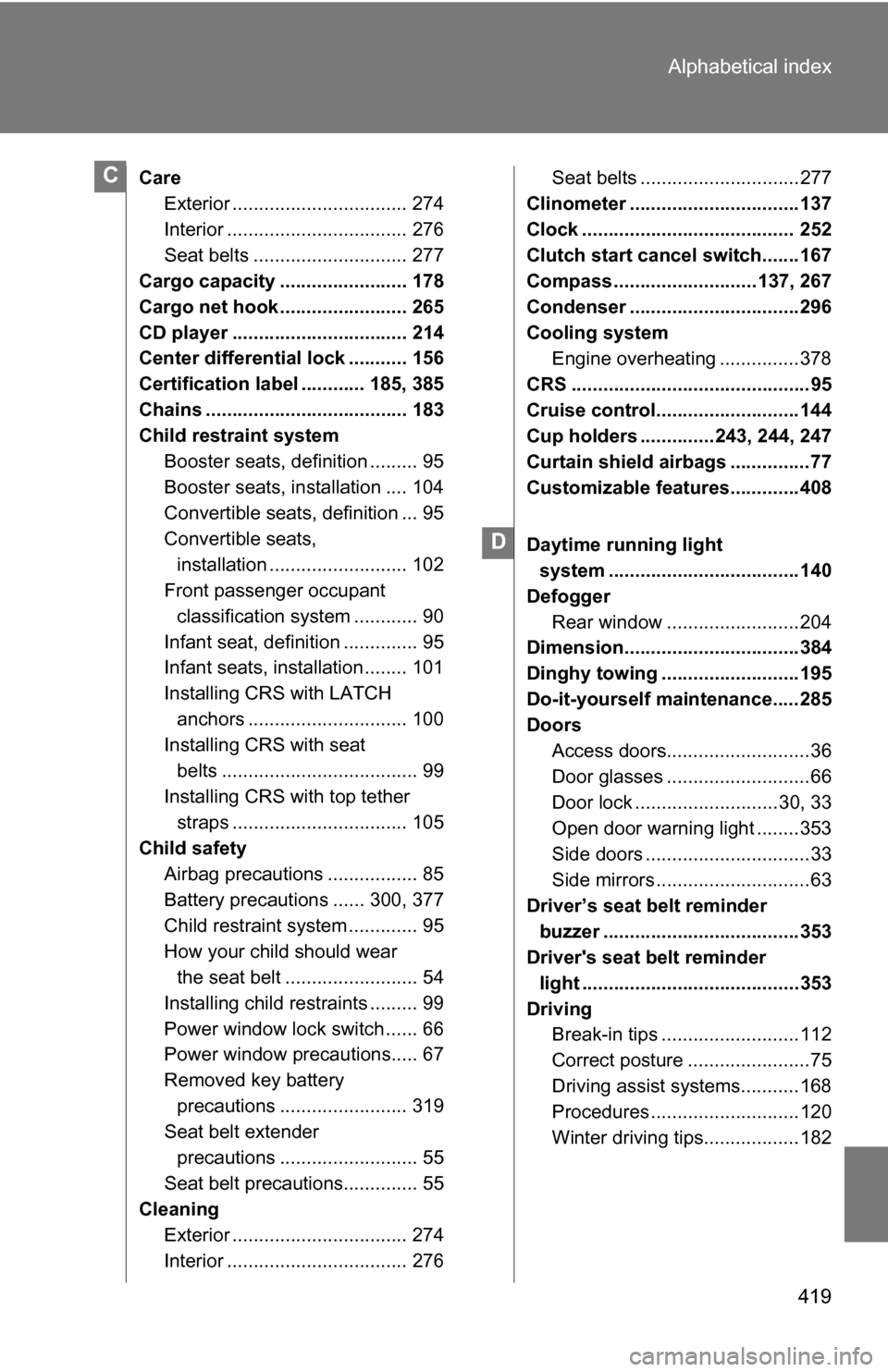
419
Alphabetical index
Care
Exterior ................................. 274
Interior .................................. 276
Seat belts ............................. 277
Cargo capacity ........................ 178
Cargo net hook ........................ 265
CD player ................................. 214
Center differential lock ........... 156
Certification label ............ 185, 385
Chains ...................................... 183
Child restraint system
Booster seats, definition ......... 95
Booster seats, installation .... 104
Convertible seats, definition ... 95
Convertible seats, installation .......................... 102
Front passenger occupant
classification system ............ 90
Infant seat, definition .............. 95
Infant seats, installation ........ 101
Installing CRS with LATCH anchors .............................. 100
Installing CRS with seat
belts ..................................... 99
Installing CRS with top tether straps ................................. 105
Child safety Airbag precautions ................. 85
Battery precautions ...... 300, 377
Child restraint system ............. 95
How your child should wear the seat belt ......................... 54
Installing child restraints ......... 99
Power window lock switch ...... 66
Power window precautions..... 67
Removed key battery precautions ........................ 319
Seat belt extender
precautions .......................... 55
Seat belt precautions.............. 55
Cleaning
Exterior ................................. 274
Interior .................................. 276 Seat belts ..............................277
Clinometer ................................137
Clock ........................................ 252
Clutch start cancel switch.......167
Compass ...........................137, 267
Condenser ................................296
Cooling system Engine overheating ...............378
CRS .............................................95
Cruise control...........................144
Cup holders ..............243, 244, 247
Curtain shield airbags ...............77
Customizable features.............408
Daytime running light system ....................................140
Defogger Rear window .........................204
Dimension.................................384
Dinghy towing ..........................195
Do-it-yourself main tenance.....285
Doors
Access doors...........................36
Door glasses ...........................66
Door lock ...........................30, 33
Open door warning light ........353
Side doors ...............................33
Side mirrors .............................63
Driver’s seat belt reminder buzzer .....................................353
Driver's seat belt reminder
light .........................................353
Driving Break-in tips ..........................112
Correct posture .......................75
Driving assist systems...........168
Procedures ............................120
Winter driving tips..................182C
D
Page 420 of 432
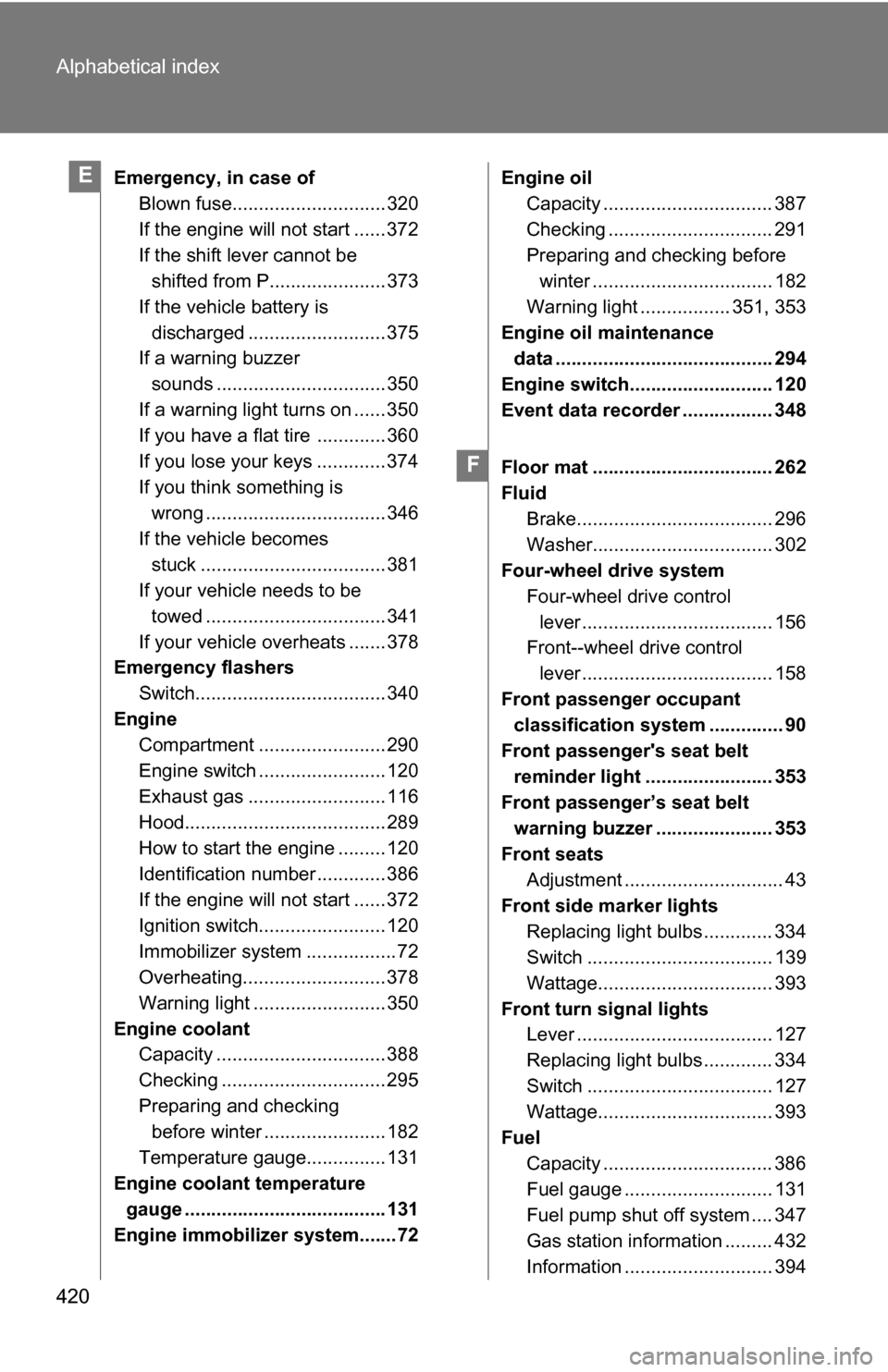
420 Alphabetical index
Emergency, in case ofBlown fuse............................. 320
If the engine will not start ...... 372
If the shift lever cannot be shifted from P...................... 373
If the vehicle battery is discharged .......................... 375
If a warning buzzer
sounds ................................ 350
If a warning light turns on ...... 350
If you have a flat tire ............. 360
If you lose your keys ............. 374
If you think something is wrong .................................. 346
If the vehicle becomes stuck ................................... 381
If your vehicle needs to be
towed .................................. 341
If your vehicle overheats ....... 378
Emergency flashers
Switch.................................... 340
Engine Compartment ........................ 290
Engine switch ........................ 120
Exhaust gas .......................... 116
Hood...................................... 289
How to start the engine ......... 120
Identification number ............. 386
If the engine will not start ...... 372
Ignition switch........................ 120
Immobilizer system .................72
Overheating........................... 378
Warning light ......................... 350
Engine coolant Capacity ................................ 388
Checking ............................... 295
Preparing and checking before winter ....................... 182
Temperature gauge............... 131
Engine coolan t temperature
gauge ...................................... 131
Engine immobilizer system.......72 Engine oil
Capacity ................................ 387
Checking ............................... 291
Preparing and checking before winter .................................. 182
Warning light ................. 351, 353
Engine oil maintenance data ......................................... 294
Engine switch........................... 120
Event data recorder ................. 348
Floor mat .................................. 262
Fluid Brake..................................... 296
Washer.................................. 302
Four-wheel drive system
Four-wheel drive control lever .................................... 156
Front--wheel drive control
lever .................................... 158
Front passenger occupant classification system .............. 90
Front passenger's seat belt reminder light ........................ 353
Front passenger’s seat belt
warning buzzer ...................... 353
Front seats Adjustment .............................. 43
Front side marker lights Replacing light bulbs ............. 334
Switch ................................... 139
Wattage................................. 393
Front turn signal lights Lever ..................................... 127
Replacing light bulbs ............. 334
Switch ................................... 127
Wattage................................. 393
Fuel Capacity ................................ 386
Fuel gauge ............................ 131
Fuel pump shut off system .... 347
Gas station information ......... 432
Information ............................ 394E
F